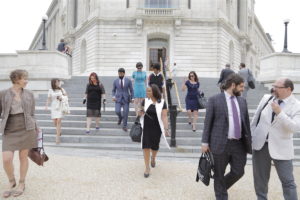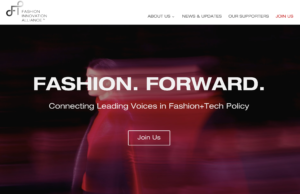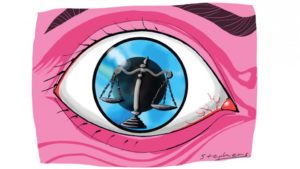Law and Order. How to Get Away With Murder. For ages the laws that bind our behaviors and regulate what we do have been centerpieces for television dramas and film. But many people have yet to familiarize themselves with the fashion legal industry.
Fashion Law. While most people tend to think of law in relation to criminal courtrooms the law actually spans so many industries that are an integral part of our daily life. In fact, there is a whole side of the law that addresses the world that makes your wardrobe. While fashion law may seem glamorous there are many sides to this subsection of the law from online regulations, trademark, trade law, copyright to even real estate law. Both fashion companies and fashion entrepreneurs deal with a large variety of issues within their industry.
Cachet Digital talks fashion law and legal regulations that affect both entrepreneurs in the fashion industry as well as women business owners with attorney Kenya Wiley.

Wiley recently wrote an article in ELLE magazine on policy issues affecting female entrepreneurs and the fashion industry: The Hidden Ways That Government Policy Affects Female Entrepreneurs And what we can do about it. Both Women’s Wear Daily and Roll Call have highlighted her organization’s 2016 fashion tech showcase on Capitol Hill as well as her transition from the Hill to focusing on fashion tech policy.
Kenya and I met a few years ago in DC and quickly bonded over our love of fashion law. At the time I was on the board of one of the country’s first fashion law conference. It was a pleasure to catch up with her and share what she does with our readers. Check out her interview below:
Why do female entrepreneurs need to educate themselves on the importance of basic legal principles?
Fashion designers and fashion tech entrepreneurs usually work with their attorneys to handle their business formation, tax filings and trademark registration/patent applications. But it’s important for entrepreneurs to remain in control of their businesses — even if they’re getting advice from their attorneys. As the late philosopher Sir Francis Bacon said, “knowledge is power.”
Having a basic understanding of the legal principles will help entrepreneurs make better-informed decisions, and it could also save time and money. Even today, when I’m going through monthly bills from outside counsel, I have an idea as to whether the attorneys actually spent the billable hours noted for their services. If I have any reason to doubt that they spent significantly less time on the actual services, I will let them know. It’s also helpful to have a basic understanding if an attorney proposes a legal strategy that you believe is not in the best interest of your business goals.
How does what you do in Washington impact entrepreneurs and fashion industry members?
I see my work in Washington as two-fold. First, my goal is to help entrepreneurs stay connected with key legislative and regulatory developments in real time so that they can focus on running the day-to-day operations of their businesses. My second goal is to make sure that policymakers in Washington are aware of the economic growth and social good of entrepreneurs in fashion tech. My focus right now is on fashion tech. I currently chair ASTM International’s task group on data security for smart textiles—where we’re looking at global standards and policies related to the entire smart textiles ecosystem (from designers and manufacturers to the end-users).

What is fashion law?
The concept of fashion law has evolved over time. When I first became engaged in fashion law, the focus was on intellectual property, labor, customs and trade for apparel and footwear. Now, as technology has transformed how we experience fashion, other areas of the law also impact the business of fashion. For example, I worked on cybersecurity policy issues when I served as counsel and senior policy advisor for the Senate Homeland Security and Governmental Affairs Committee. Now —with e-commerce and other digital platforms, cybersecurity law is an important area for the fashion industry, along with data privacy. I also work with many designers who are committed to sustainable manufacturing and thus, environmental law and policy is another important issue.

How did you get into fashion law and the whole policy aspect of it?
I started my own jewelry design business while I was working as a policy counsel on Capitol Hill. So as a business owner, I kept abreast of the business and legal developments in order to protect my designs and overall brand but also the content on my website. I became friendly with fashion industry insiders and they were always very intrigued by the happenings on Capitol Hill and the impact on their businesses. We would engage over calls and during my visits to New York, but then I decided to package that information for everyone in the industry —which is how I launched Fashion Cloture —my first fashion policy blog in 2011.
What can female fashion entrepreneurs do to stay in the loop in regards to policy decisions that may affect them?
First and foremost, I invite them to follow the Fashion Innovation Alliance. Axios is another great resource for getting brief updates on tech, politics and business.

What exactly is the Fashion Innovative Alliance?
We launched The Fashion Innovation Alliance (FIA) in 2016 to provide a platform and voice for leaders in fashion and technology committed to public policy, access, education, and innovation for fashion tech. Often times, when we think of fashion tech, fitness trackers and smart watches and other wearable accessories come to mind. But the field of fashion tech continues to grow and evolve —with smart fabrics, digital commerce, augmented reality/virtual reality for retail and now artificial intelligence. Just to show the advancement of fashion tech, the smart fabric startup Loomia was named a finalist for the recent LVMH Innovation Award at Viva Technology in Paris.
We initially launched FIA so that leaders in fashion tech would have a voice in U.S. policy, but since then, we’ve expanded our policy outreach to Europe as well, focusing on entrepreneurship and the EU’s privacy and data protection laws, and the impact on fashion tech. Our team has been back and forth to Europe this year, presenting on the Internet of Things and policy implications for fashion tech. In June we joined smart fabric startup Loomia in Paris for the LVMH Innovation Award and Luxury Lab at Viva Technology.
We’re also working to help female entrepreneurs receive the necessary capital and help position them for growth, whether in the U.S. or abroad. Through my experience as a female founder of color working with women entrepreneurs across the United States, I have seen firsthand the gender and racial imbalances among tech startups and investors. I attended a Demo Day earlier this year for fashion entrepreneurs and there was not one startup founder of color.
Since FIA’s launch, the Alliance has brought together visionaries in fashion and technology through numerous initiatives. These include FIA’s Fashion Tech Showcase on Capitol Hill, a post-election event on STEAM (science, technology, engineering, arts and math) education, innovation, and immigration, as well as numerous curated gatherings with White House officials, Members of Congress and staff, academics, and venture capitalists. We also believe that it’s critical to engage at the policy level, which is why we’ve submitted detailed recommendations to federal policymakers in response to agency requests covering the Internet of Things (IoT) for fashion tech, cybersecurity in the digital economy, and immigration reform.

For our readers, who are looking to you as a source of inspiration because of your success what advice do you have for them? What has contributed to making you the woman you are today?
Thanks so much. First, I always made education a priority. I’m blessed to have parents who invested in my education from the very beginning. Second, I gave my all and learned as much about every issue and task assigned early in my career —no matter how unglamorous. During the early stages of my legal career I handled federal ethics (civil and criminal) and government management issues. I’ve ended up working on federal ethics issues in every position since then—even while at the Motion Picture Association of America (MPAA). In February, I presented on government ethics and regulatory reform at the Fashion Law Institute’s Annual Symposium. As we’ve seen in the past year, government ethics for political officials —especially for criminal conflicts of interest —has become a hot issue in Washington. I also handled employment-based immigration matters early in my legal career —related to the Departments of Labor and Homeland Security. Now, given the significant impact of immigrant entrepreneurs in fashion and tech and changes to U.S. immigration policy, my background in immigration policy has been very helpful.

How do you deal with being a woman in a mostly male dominated industry?
I’ve come to accept that not everyone will be supportive (that’s just life), but I also try not to take anything personally and stay focused on my long-term goals. I’ve also been blessed to have very supportive mentors along the way —Dean Everett Bellamy from Georgetown Law, Senator Thomas Carper, Martina Bradford and Robert Primus while working on Capitol Hill and Henry Hoberman (former General Counsel while I worked at MPAA and now Executive Vice President and General Counsel for A+E networks). It really does take a village.
Feel free to check out her media/recap page for FIA’s 2016 fashion tech showcase on Capitol Hill (here) and also another recent article Wiley wrote (here) on the changing culture of tech & start up companies. Please take a moment to visit Kenya’s website fashioninnovation.org as well as connect with her on instagram via @KenayNWiley and twitter @KenyaNWiley.







